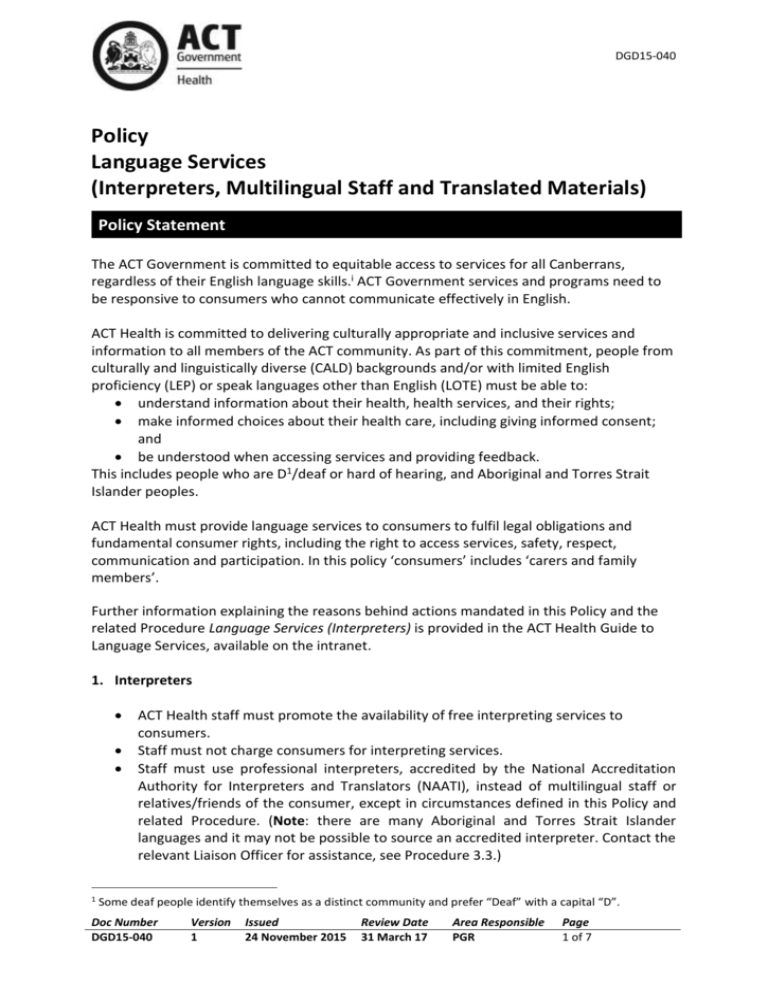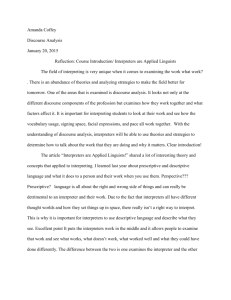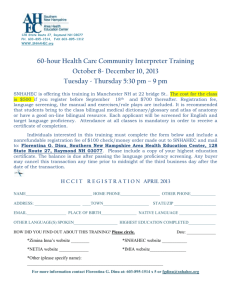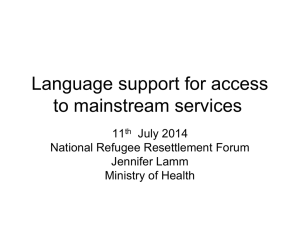Language Services Policy - ACT Health
advertisement

DGD15-040 Policy Language Services (Interpreters, Multilingual Staff and Translated Materials) Policy Statement The ACT Government is committed to equitable access to services for all Canberrans, regardless of their English language skills.i ACT Government services and programs need to be responsive to consumers who cannot communicate effectively in English. ACT Health is committed to delivering culturally appropriate and inclusive services and information to all members of the ACT community. As part of this commitment, people from culturally and linguistically diverse (CALD) backgrounds and/or with limited English proficiency (LEP) or speak languages other than English (LOTE) must be able to: understand information about their health, health services, and their rights; make informed choices about their health care, including giving informed consent; and be understood when accessing services and providing feedback. This includes people who are D1/deaf or hard of hearing, and Aboriginal and Torres Strait Islander peoples. ACT Health must provide language services to consumers to fulfil legal obligations and fundamental consumer rights, including the right to access services, safety, respect, communication and participation. In this policy ‘consumers’ includes ‘carers and family members’. Further information explaining the reasons behind actions mandated in this Policy and the related Procedure Language Services (Interpreters) is provided in the ACT Health Guide to Language Services, available on the intranet. 1. Interpreters 1 ACT Health staff must promote the availability of free interpreting services to consumers. Staff must not charge consumers for interpreting services. Staff must use professional interpreters, accredited by the National Accreditation Authority for Interpreters and Translators (NAATI), instead of multilingual staff or relatives/friends of the consumer, except in circumstances defined in this Policy and related Procedure. (Note: there are many Aboriginal and Torres Strait Islander languages and it may not be possible to source an accredited interpreter. Contact the relevant Liaison Officer for assistance, see Procedure 3.3.) Some deaf people identify themselves as a distinct community and prefer “Deaf” with a capital “D”. Doc Number DGD15-040 Version 1 Issued 24 November 2015 Review Date 31 March 17 Area Responsible PGR Page 1 of 7 DGD15-040 Children under the age of 18 years must never be used to interpret. For interpreting in languages other than English (LOTE), the national Translating and Interpreting Service (TIS) is the preferred provider for ACT. The Procedure Language Services – Interpreters provides information for clinical and non-clinical settings about the use of: o professional accredited interpreters (in Auslan, Aboriginal and Torres Strait Islander languages, and LOTE); and o non-professional interpreting by multilingual staff or relatives/friends of the consumer. Staff must document the following information on consumer clinical records, including consent forms: o each occasion of use of a professional, accredited interpreter; o each occasion of use of a non-professional interpreter (including multilingual staff, and relatives/friends of the consumer); and o reasons for continuing the appointment/treatment/procedure in the absence of interpreting services. The use of a non-professional interpreter in clinical situations must also be documented in RiskMan. 2. Multilingual staff Multilingual staff are not employed as professional interpreters. Due to clinical and legal risks, ACT Health staff must not ask multilingual staff to interpret on medical or clinical issues, except in emergencies where a professional interpreter is not immediately available. Multilingual staff who agree may interpret on low-risk, non-clinical issues to enhance the patient experience, such as explaining the location of an appointment or visiting hours. Staff should first contact multilingual staff receiving the Linguistic Availability/Performance Allowance (LAPA). People, Strategy and Services Branch maintain a list of languages spoken by staff members and their LAPA status. A staff member who speaks the same language as a consumer may communicate in that language with that patient, including about medical or clinical issues. 3. Translated materials (use and development) ACT Health staff should give relevant translated materials to consumers with LEP, if possible. If translated materials are not available, or if the consumer has low literacy, staff must explain necessary information to consumers using an interpreter. The process for developing handouts/publications for consumers, including materials in LOTE, is outlined in the Policy Consumer Handouts. If staff decide to translate existing material or to develop new material in LOTE, they must contact the Multicultural Health Policy Unit (MCHPU) on 6205 1011 or multiculturalhealth@act.gov.au for support. Doc Number DGD15-040 Version 1 Issued 24 November 2015 Review Date 31 March 17 Area Responsible PGR Page 2 of 7 DGD15-040 Purpose The purpose of this policy is to ensure that ACT Health provides language services to meet the requirements of: ACT Government Languages Policy – Many Voices 2012-2016; Australian National Safety and Quality Health Service Standards; Other legislation and standards relating to the rights of and communication with people from CALD backgrounds and/or with LEP; and Towards Culturally Appropriate and Inclusive Services – A Co-ordinating Framework for ACT Health 2014-18. Scope This policy pertains to all Health Directorate staff, including contractors and volunteers, who: communicate with consumers, in administrative, clinical and non-clinical settings and through consumer publications; are involved in resource allocation or funding of ACT Health services and programs; speak LOTE; supervise multilingual ACT Health staff (including those receiving LAPA); and/or administer contracts or service funding agreements with external service providers. Roles & Responsibilities All ACT Health staff: o must use professional, accredited interpreters when needed (except in defined circumstances outlined in this policy and the Procedure Language Services – Interpreters), and should provide translated materials if available and when needed, to communicate with people with LEP who are at risk of not being able to understand and/or provide necessary information. Deputy Directors-General: o administer the LAPA provisions of relevant Enterprise Agreements, in conjunction with People, Strategy and Services Branch. Executive Directors/Branch and/or Unit Managers: o actively promote and increase the use of professional interpreters and translated materials; o make materials available and accessible to consumers (e.g., on public websites, displaying in waiting areas, including in admission information packs, etc.); and o provide appropriate spaces and speaker phones and/or dual handset phones to facilitate interpreting services, where possible. Doc Number DGD15-040 Version 1 Issued 24 November 2015 Review Date 31 March 17 Area Responsible PGR Page 3 of 7 DGD15-040 Multicultural Health Policy Unit: o promote the availability of interpreters and translated materials, including feedback mechanisms, in conjunction with Communications and Marketing Unit; o develop materials/training programs to support staff to promote and use interpreters and translated materials, in conjunction with People, Strategy and Services Branch; o monitor and report on the use of interpreters (including regular audits in conjunction with Health Care Improvement); o support staff to develop translated materials; and o respond to feedback from staff and consumers on interpreting and translation services, and liaise with organisations providing these services. Health Care Improvement Division: o include questions relating to interpreters and translated materials in patient surveys; and o conduct regular audits (related to the National Safety and Quality Health Service Standards) on the documentation of interpreter use, particularly in relation to informed consent. People, Strategy and Services Branch: o manage and administer the LAPA provisions of relevant Enterprise Agreements, in conjunction with Deputy Directors-General; and o maintain records of LOTE spoken by staff. Staff Development Unit: o develop materials/training programs to support staff to promote and use interpreters and translated materials, in conjunction with the Multicultural Health Policy Unit. Executive Council/Executive Directors’ Council: o Provide direction to address compliance issues or barriers to implementation. Evaluation Outcome Measures Number of times professional interpreters have been engaged. Type of interpreting service used (telephone or on-site). Languages for which interpreters have been engaged. Quarterly expenditure on interpreter and translation services. Number of times interpreters have been requested but are not available (including language requested). Number of times interpreters have been requested and subsequently declined by a consumer (including reason for declining). Compliance with requirement to document interpreter use. Number of staff receiving LAPA, number of times a non-professional interpreting service has been provided, and in which languages. Number of staff who have completed training in working with interpreters. Doc Number DGD15-040 Version 1 Issued 24 November 2015 Review Date 31 March 17 Area Responsible PGR Page 4 of 7 DGD15-040 Method The following data will be collected by MCHPU and reported regularly to the Executive Council, the ACT Health Annual Report and the biennial Chief Health Officer’s Report. Deputy Directors-General will also be provided with summary reports for distribution within Divisions. Interpreter and translator usage (data provided quarterly/annually by TIS/Auslan interpreter/translation provider). Audits of interpreter use and documentation (in conjunction with Health Care Improvement Division). LAPA uptake (data provided biannually by People, Strategy and Services Branch). Routine ACT Health service data collection (including ACTPAS ) on CALD consumers to support needs analysis, i.e., main language spoken at home, English proficiency, country of birth. Data from Capabiliti about staff undertaking relevant training. Related Policies, Procedures, Guidelines and Legislation Policies Australian Capital Territory Languages Policy Many Voices: 2012-16 Procedures ACT Health Procedure Language Services – Interpreters Canberra Hospital and Health Services, Clinical Procedures: o Consent and Treatment o Clinical Handover o Patient Identification and Procedure Matching Frameworks Australian Safety and Quality Framework for Health Care Australian Charter of Healthcare Rights Australian Capital Territory Multicultural Strategy 2010-2013 (next version to be developed in 2015) Towards Culturally Appropriate and Inclusive Services, a Co-ordinating Framework: ACT Health (2014-2018) ACT Health Guide to Language Services Standards National Safety and Quality Health Service (NSQHS) Standards o Standard 1: Governance for Safety and Quality in Health Service Organisations o Standard 2: Partnering with Consumers o Standard 3: Preventing and Controlling Healthcare Associated Infections o Standard 4: Medication Safety o Standard 5: Patient Identification and Procedure Matching o Standard 6: Clinical Handover o Standard 7: Blood and Blood Products Doc Number DGD15-040 Version 1 Issued 24 November 2015 Review Date 31 March 17 Area Responsible PGR Page 5 of 7 DGD15-040 o Standard 8: Preventing and Managing Pressure Injuries o Standard 9: Recognising and Responding to Clinical Deterioration in Acute Care o Standard 10: Preventing Falls and Harm from Falls National Standards for Mental Health Services 2010 o Standard 4: Diversity Responsiveness Australian Bureau of Statistics – Standards for Statistics on Cultural and Language Diversity 1999. Legislation Mental Health (Treatment and Care) Act 1994 Work Health and Safety Act 2011 Human Rights Act 2004 Discrimination Act 1991 Health Act 1993 Definition of Terms Auslan: The language of the Australian Deaf community. Auslan is a unique sign language. CALD: Culturally and linguistically diverse. Consumer: Anyone who uses, has used, or may use any health or health related service. It is not limited to those currently using a service.ii Interpreter: A person who conveys oral or sign messages, concepts and ideas from one language into another language (including sign language), with a high degree of accuracy, completeness, objectivity and sensitivity to the cultures associated with the languages of expertise. The interpreter is responsible for the communication process between the two parties and not for the information provided.iii LEP: Limited English proficiency. Translator: A person who makes a written transfer of a written message or information from one language into another language to provide complete and accurate text reflecting the original material. The translator is responsible for the communication process between the two parties and not for the information provided. Search Terms Multicultural; Interpreter; Translation; Multilingual; Languages; Languages other than English; Cultural and Linguistic Diversity; Auslan; Deaf; Aboriginal and Torres Strait Islander. Attachments Attachment 1: Procedure (Language Services - Interpreters) Doc Number DGD15-040 Version 1 Issued 24 November 2015 Review Date 31 March 17 Area Responsible PGR Page 6 of 7 DGD15-040 References ACT Community Services Directorate (2012). Many Voices: 2012-16 Australian Capital Territory Languages Policy. Canberra: ACT Government. ii Health Care Consumers’ Association (n.d.). Who is a health care consumer? Accessed 17 June 2014 at http://www.hcca.org.au/consumers/what-is-a-consumer iii Government of Western Australia (2014) Western Australian Language Services Policy 2014 and Guidelines. Perth: Department of Local Government and Communities, Office of Multicultural Interests. i Date Amended Eg: 17 August 2014 Section Amended Section 1 Approved By PAC Disclaimer: This document has been developed by ACT Health, Strategy and Corporate Division, Policy and Government Relations Branch, Multicultural Health Policy Unit, specifically for its own use. Use of this document and any reliance on the information contained therein by any third party is at his or her own risk and Health Directorate assumes no responsibility whatsoever. Doc Number DGD15-040 Version 1 Issued 24 November 2015 Review Date 31 March 17 Area Responsible PGR Page 7 of 7








